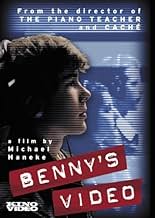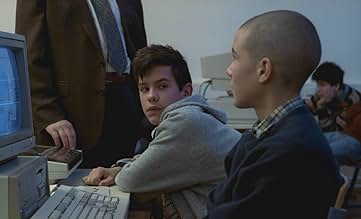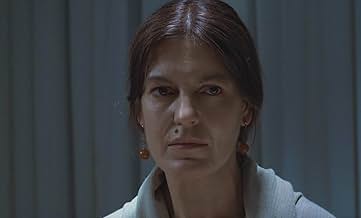A 14-year-old video enthusiast obsessed with violent films decides to make one of his own and show it to his parents, with tragic results.A 14-year-old video enthusiast obsessed with violent films decides to make one of his own and show it to his parents, with tragic results.A 14-year-old video enthusiast obsessed with violent films decides to make one of his own and show it to his parents, with tragic results.
- Awards
- 2 wins & 3 nominations total
Imelda Marcos
- Self
- (archive footage)
- (uncredited)
Hans Meiser
- Self
- (archive footage)
- (uncredited)
Brigitte Reimann
- Self
- (archive footage)
- (uncredited)
Martin Schoendeling
- Sales manager in videostore
- (uncredited)
- Director
- Writer
- All cast & crew
- Production, box office & more at IMDbPro
Featured reviews
5FKDZ
Benny's Video is a slow methodical drama circling around the psyche of character decisions made through the movie. It has a strong start, and one that puts you into it right away with some disturbing footage. But then after 30 minutes or so it becomes a uneventful, both in events and character. Leading to a very slow end.
Directing is static, impactful and methodical. It's not afraid to sway from the norm, long takes that last forever. Enabling the viewer to be sucked in in certain moments. That is when it works, but there's also long lasting scenes on simply a TV. Now the I get it, the violence shown in the news and movie is supposed to be interesting and the 'story'' behind the actions. But it's dull and repeated too often. That said the directing in general managed to mostly keep me engaged and curious.
Sadly that curiosity is not rewarded. As a story it fits the notion of ''art house'' film, without a proper message to end with. But with a message as a whole. Perhaps back then it was more relevant, surely. But it makes for a weaker film now.
Acting is a standout, great work from all involved. Music, non existent. Sound design, maybe I'm weird but the eating and subtle sounds made this movie more uncomfortable than the disturbing stuff. Or maybe it was a mix of both. Just odd.
Decent but not as effective as I'd hoped.
Directing is static, impactful and methodical. It's not afraid to sway from the norm, long takes that last forever. Enabling the viewer to be sucked in in certain moments. That is when it works, but there's also long lasting scenes on simply a TV. Now the I get it, the violence shown in the news and movie is supposed to be interesting and the 'story'' behind the actions. But it's dull and repeated too often. That said the directing in general managed to mostly keep me engaged and curious.
Sadly that curiosity is not rewarded. As a story it fits the notion of ''art house'' film, without a proper message to end with. But with a message as a whole. Perhaps back then it was more relevant, surely. But it makes for a weaker film now.
Acting is a standout, great work from all involved. Music, non existent. Sound design, maybe I'm weird but the eating and subtle sounds made this movie more uncomfortable than the disturbing stuff. Or maybe it was a mix of both. Just odd.
Decent but not as effective as I'd hoped.
I found this movie to be very disturbing, though it is not a violent movie. Benny is a normal teenager, except for his rather horrid taste for gore and death. This is a very thought provoking movie stumbling through a couple of different immoral issues, the end of this movie was a bit different to what I was expecting and did sort of knock me off place. I give it an 8 out of 10.
From its opening sequence, the film immerses us in Benny's world, an adolescent who lives through the images he captures with his handycam and what he watches on television. These images, where reality, media, and fantasy blend without clear boundaries, shape his perception of the world: saturated with spectacles, chaotic, and lacking deep understanding.
The plot gradually reveals that this apparent visual chaos conceals something far darker and macabre. Benny receives an advanced video camera from his parents, a gift intended to compensate for the lack of affection in his upbringing. However, this present becomes a tool that allows him to emotionally isolate himself and create his own world through the lens, disconnecting even more from his family and social environment.
Haneke's cold, clinical style enhances this disconnection, with slow-paced direction that emphasizes unsettling details, like Benny's manipulation of recordings. This approach leads us to a profound examination of the influence of media on the perception of reality, the normalization of violence, and the emotional impact it has on the youth.
A key symbol in the narrative is the video of the pig's slaughter, recorded by Benny. This repeated act not only desensitizes him to violence but also reinforces the notion that, for him, reality turns into a spectacle that can be controlled, edited, and replayed at will.
The film raises essential questions about the boundaries between reality and fiction, the responsibility of parents in the emotional formation of their children, and how media and technology shape our behavior and perception of the world. Although the story was conceived in another era, it eerily anticipates our present, where life seems not to exist unless it's captured on camera or posted on social media.
The plot gradually reveals that this apparent visual chaos conceals something far darker and macabre. Benny receives an advanced video camera from his parents, a gift intended to compensate for the lack of affection in his upbringing. However, this present becomes a tool that allows him to emotionally isolate himself and create his own world through the lens, disconnecting even more from his family and social environment.
Haneke's cold, clinical style enhances this disconnection, with slow-paced direction that emphasizes unsettling details, like Benny's manipulation of recordings. This approach leads us to a profound examination of the influence of media on the perception of reality, the normalization of violence, and the emotional impact it has on the youth.
A key symbol in the narrative is the video of the pig's slaughter, recorded by Benny. This repeated act not only desensitizes him to violence but also reinforces the notion that, for him, reality turns into a spectacle that can be controlled, edited, and replayed at will.
The film raises essential questions about the boundaries between reality and fiction, the responsibility of parents in the emotional formation of their children, and how media and technology shape our behavior and perception of the world. Although the story was conceived in another era, it eerily anticipates our present, where life seems not to exist unless it's captured on camera or posted on social media.
In his second film of the "glaciation trilogy", Haneke once more hauntingly draws a torpid affluent society where the people live at cross purposes, where conservations are rare and toilsome, where communication is alienated to a technical process. Accordingly to that, the emotional life of the protagonists became stunted: Benny, after his "act", shows concernment only through surrogate actions, just like letting his hair cropped. The father immediately slyly pushes to damage mitigation, whereas only the mother indicates rudiments of emotion, though somehow tense. In a confusing blend of film and video images, Haneke creates a second level of reality, so to speak, where Benny's senseless "act" perfectly integrates in the horror pictures of the evening news and makes it open for question. At the same time, Haneke commits himself to no specific answer and denies any absolution. That is what makes this film so horrifying - there simply is no telling argument that makes a murderer out of a young boy.
If it is supposed to be a Haneke film, it does have a couple of pitfalls. It is not Haneke's best, perhaps because maybe he felt the pressure to top Der Siebente Kontinent. As someone said previously, it is rather heavyweight towards the end.
As a film without regarding who directed it, it is very good. It provides you with a raw documentary vision of a boy and his voyeuristic trend towards violence. It is rather simple yet, an amazing idea. Benny could be the boy living next door and, in fact, he is. He is not frightning on a "I know what you did last Summer" fashion. He is _truly_ frightning because he is a normal kid. And I do know a few like him. The ones I know never actually murdered anyone but, perhaps they simply didn't do it because they are afraid. Benny hasn't come to terms with that moral feeling yet and perhaps he never will.
On a metaphorical sense, it is the best portrait (along with Der Siebente Kontinent) of present day Austria, at least the Austria I see at some September rainy Vienna weekends...
As a film without regarding who directed it, it is very good. It provides you with a raw documentary vision of a boy and his voyeuristic trend towards violence. It is rather simple yet, an amazing idea. Benny could be the boy living next door and, in fact, he is. He is not frightning on a "I know what you did last Summer" fashion. He is _truly_ frightning because he is a normal kid. And I do know a few like him. The ones I know never actually murdered anyone but, perhaps they simply didn't do it because they are afraid. Benny hasn't come to terms with that moral feeling yet and perhaps he never will.
On a metaphorical sense, it is the best portrait (along with Der Siebente Kontinent) of present day Austria, at least the Austria I see at some September rainy Vienna weekends...
Did you know
- GoofsWhen Benny leaves the phone booth in Egypt, the cameraman is visible in multiple window reflections.
- ConnectionsFeatured in Zomergasten: Episode #9.5 (1996)
- How long is Benny's Video?Powered by Alexa
Details
- Release date
- Countries of origin
- Official sites
- Languages
- Also known as
- Відео Бенні
- Filming locations
- Production companies
- See more company credits at IMDbPro
Contribute to this page
Suggest an edit or add missing content



























